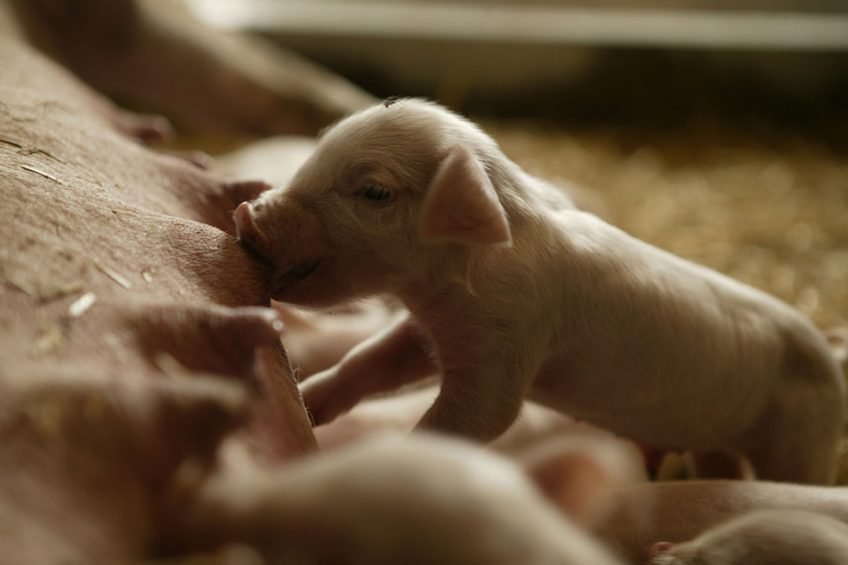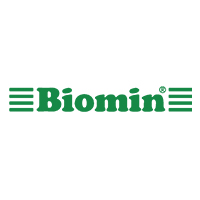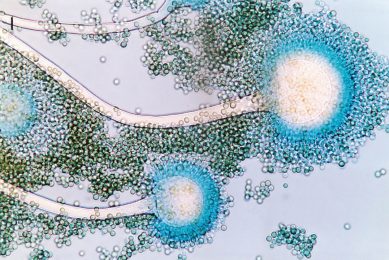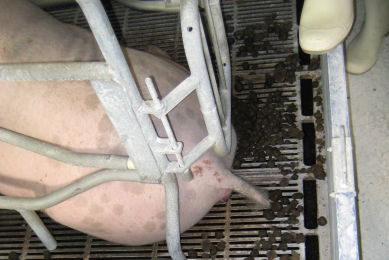Preventing postpartum dysgalactia syndrome in lactating sows

Postpartum dysgalactia syndrome (PDS) in lactating sows is very costly, as it prevents the newborn piglet getting the vital early nutrition it needs to survive and thrive. Phytogenic feed additives can be used to support sow health before, during and after farrowing to prevent PDS from affecting herd performance.
Lactation failure in sows is a common issue, mostly caused by mastitis, metritis, agalactia (MMA). Signs of mastitis, metritis or agalactia, or any combination thereof, may be exhibited following infection of the udder or uterus, or reduced milk production.
The term MMA is starting to be used less often, as the condition is now categorised as a subtype of postpartum dysgalactia syndrome (PDS). Sows affected by PDS produce insufficient colostrum and milk in the first few days after farrowing. Sows or gilts that develop agalactia will typically have normal milk production 12 to 24 hours postpartum, but this is followed by partial to complete agalactia. The farm manager or producer will know something is wrong when healthy newborn piglets stop growing, and some piglets may die without any clinical signs of disease.
PDS is closely related to herd health, water intake, nutrition and the farrowing house environment. Risk factors of PDS include:
- Concurrent disease
- High bacterial infection pressure (poor disinfection of farrowing pens)
- Mycotoxicosis (aflatoxins, zearalenone)
- Hypocalcemia and ketosis
- Poor quality or inadequate water supply
- Inadequate farrowing house temperature
- Prolonged duration of farrowing
- Lack of supervision during farrowing
- Sows dirty prior to farrowing
Role of nutrition and feeding regime
Nutrition is a significant factor in the development of PDS, and how the sow is fed from before gestation to farrowing, and throughout lactation affects the incidence of PDS. Sows are fed restricted amounts of a complete diet in days before parturition. These diets have high nutrient and energy densities, and low fibre content, which often causes drier and harder faeces, indicating an impaired passage of digesta and constipation.
Hermansson et al. (1978) reported constipation in approximately 25% of sows with agalactia. Constipated animals suffer a reduction of intestinal peristaltic movements, which changes the environmental conditions in the intestine. The levels and quality of fibre and protein in the diet are both important factors to consider.
First, a higher fibre content in the transition diets fed during the periparturient period reduces the incidence of hard faeces (constipation) and increases feed intake by the sow in early lactation. Second, it has been reported that supplementing feed with functional amino acids (e.g., arginine, cysteine, L-glutamine and leucine) can change the composition of the intestinal microbiota in the animal to improve gut health and function. Sows that are too fat at parturition are also at a higher risk of PDS and feeding sows ad libitum shortly after farrowing increased the risk of PDS compared to restricted feeding. Milk let-down and subsequent milk production was more problematic in sows fed diets with lower vitamin E levels .
Use of phytogenic feed additives
Diets containing a phytogenic feed additive (PFA) may reduce the incidence of PDS and increase feed intake during lactation. Selected PFAs have shown to have the following effects in sows:
- Stimulation of endogenous secretions
- Improvement of nutrient digestibility
- Modulation of the gut microbiota
- Reduction of inflammatory processes
- Upregulation of anti-inflammatory target genes
In the following trial, the Biomin PFA, Digestarom, was added to a sow diet for 55 days (from the 80th day of gestation until weaning). Sows fed the Digestarom diet showed increased lactation feed intake (+10%) and milk production (+15%) (Table 1). Consequently, 5.8% more piglets were weaned per litter and piglet weight was 6% higher at weaning, and the incidence of diarrhoea was substantially lower (-50%).
High colostrum and milk yields are essential for piglet viability and growth during the pre-weaning period. However, many modern pig herds have a problem with PDS. Therefore, preventive measures should be put in place in both management practices and diet formulation. Adding PFAs to the diet could form part of a nutritional strategy to improve the performance of lactating sows, and therefore their offspring.




